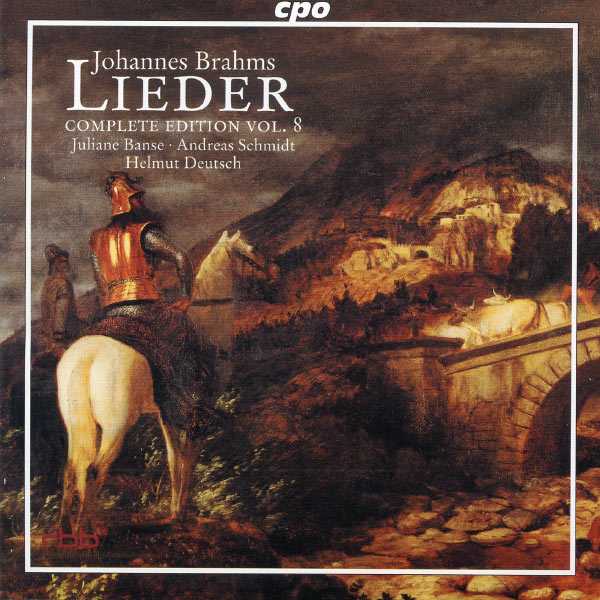
Composer: Johannes Brahms
Performer: Juliane Banse, Andreas Schmidt, Helmut Deutsch
Format: FLAC (tracks)
Label: CPO
Catalogue: 9994482
Release: 2000
Size: 169 MB
Recovery: +3%
Scan: cover
7 Lieder, op. 95
01. No. 1. Das Madchen
02. No. 2. Bei dir sind meine Gedanken
03. No. 3. Beim Abschied
04. No. 4. Der Jager
05. No. 5. Vorschneller Schwur
06. No. 6. Madchenlied
07. No. 7. Schon war, das ich dir weihte
4 Lieder, op. 96
08. No. 1. Der Tod, das ist die kuhle Nacht
09. No. 2. Wir wandelten, wir zwei zusammen
10. No. 3. Es schauen die Blumen
11. No. 4. Meerfahrt
6 Lieder, op. 97
12. No. 1. Nachtigall
13. No. 2. Auf dem Schiffe
14. No. 3. Entfuhrung
15. No. 4. Dort in den Weiden
16. No. 5. Komm Bald
17. No. 6. Trennung
5 Lieder, op. 105
18. No. 1. Wie Melodien zieht es mir
19. No. 2. Immer leiser wird mein Schlummer
20. No. 3. Klage
21. No. 4. Auf dem Kirchhofe
22. No. 5. Verrat
We live in the silver age of lieder recording. In the golden age, we had Dietrich Fischer-Dieskau’s recordings of every song for baritone ever written by pretty much every great song composer who ever lived. In the silver age, we have dozens of singers recording every song ever written by absolutely every great song composer who ever lived. In the golden age, we had Fischer-Dieskau’s magisterial recording of most of Brahms’ songs accompanied by Gerald Moore. In the silver age, we have all of Brahms’ songs recorded by some of the best singers in Austria and Germany.
In this, the eighth and penultimate volume of all Brahms’ songs on CPO, pianist Helmut Deutsch is joined by soprano Juliane Banse and baritone Andreas Schmidt in a recital of four sets of Brahms songs from 1883 through 1886, the years of the Third and Fourth symphonies. Banse has a dulcet, beguiling tone and Schmidt is now as he always has been the best of the post-Fischer-Dieskau German baritones with a strong but sympathetic tone. Helmut Deutsch provides masterful accompaniments that are always there but never too much so. The songs themselves are as great in their way as the Third and Fourth, but more intimate, more personal, more emotional, more heartfelt, and perhaps even more affecting. CPO’s late-’90s sound is close, warm, and true.



